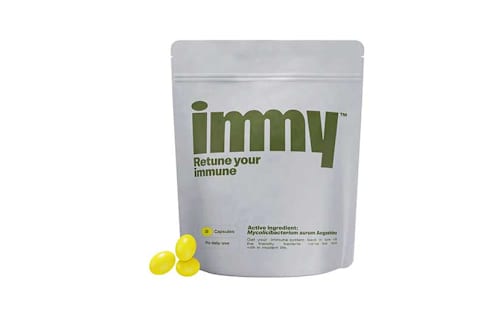Advertisement
3 Things We Learned About The Gut Microbiome
Gut health has become a hot topic in recent years, and it's for a good reason. The gut microbiome contains 100 trillion (!) microorganisms, all of which work together to support myriad aspects of health. This includes immune function and longevity, two factors that may be enhanced by reintroducing ancient bacteria into our systems.
To learn more about this deep connection, mindbodygreen co-founder and co-CEO Jason Wachob chatted with Dr. Charles Akle, immy’s chief medical officer. Press play to learn how the gut supports immune function, what modern life is doing to our gut microbiomes, and how immy—a daily immune supplement—can enhance the body's resilience by reintroducing friendly bacteria.*
1. Gut diversity is key for health and longevity
ICYMI above, the gut is a major player in health and well-being. But in order for the gut to do this job, it needs to contain many different species of microorganisms, a concept known as gut diversity.
"The microbiome is something that really hinges on diversity," Akle tells Wachob. In other words, it's not just about having a few different bugs here and there but instead, a vast array of species.
Akle explains further, "There are companies out there trying to search out the four, five, twenty organisms that might make a difference. In fact, it's 40,000 to 50,000 species, and each one of us has a unique microbiome, like a fingerprint." So much so that it's possible to identify a person from their microbiome alone, says Akle.
When the gut is diverse, it can properly regulate the immune system, a key factor in overall health and longevity. After all, as Akle notes, the immune system is what keeps us healthy and helps us stay alive. "It has a defensive role and creative role, and without the microbiome, it won't function," says Akle.
2. Modern life has reduced gut diversity
Unfortunately, our gut diversity has changed over time due to modern living. More specifically, factors like urban settings, hyper-cleanliness, and parts of the Western diet have dramatically changed our microbiome, according to Akle.
That's where the Hygiene Hypothesis comes in. It's the idea that you need to be exposed to dirt (and therefore, certain microorganisms) to develop a healthy immune system. "It's good for you without going too far," says Akle.
This is related to the Old Friends Hypothesis, which expands that theory into the microbiome. It states that being exposed to environmental microorganisms when you're a baby strengthens your immune response (which, again is rooted in the gut), making you less prone to immune-related issues.
However, with modern living, we've lost touch with ancient microorganisms—including mycobacteria found in the soil, mud, and water. This has caused issues with our immune response, as proven by the spike in allergies and associated challenges.
3. It's possible to reintroduce ancient bacteria to your gut
When it comes to increasing gut diversity and boosting the body's defense, many people focus on pre- and postbiotics.
But these options don't include mycolicibacteria, an ancient bacterium our ancestors were regularly exposed to through the soil.
This doesn't mean you should start poking and prodding at dirt, however. A safer solution is to take immy, a daily immune supplement that adds mycolicibacteria back to your system.*
"Mycolicibacteria, by definition, are entirely nonpathogenic and benign," shares Akle. immy specifically uses Mycolicibacterium aurum Aogashima (M. aurum), a bacterium that helps different parts of your gut and immune system work together.* This is supported with a strong science knowledge base of mycolicibacteria in both human and clinical studies.
Essentially, if your gut was an orchestra, immy is the conductor. "You have all these different musical instruments in the orchestra, but somebody has to put it all together and get the music," says Akle.

